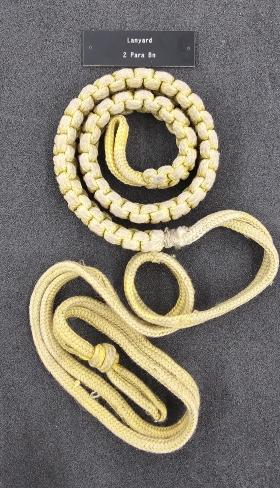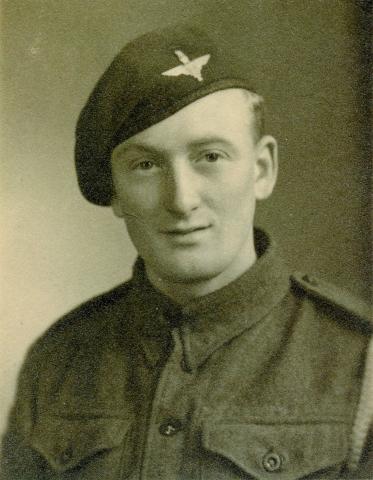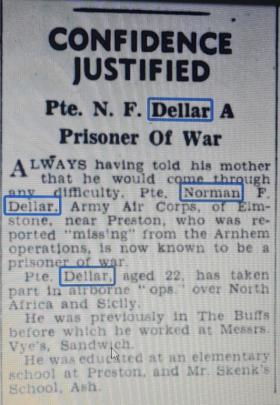Norman Frederick Dellar was born on the 21 April 1922. At the age of 18, Norman enlisted into The Buffs (Royal East Kent Regiment), on the 12 August 1940. [1]
Having volunteered for Airborne Forces he did Parachute Course 63 at RAF Ringway, 4 to 17 May 1943. This was a large course of reinforcements for the 1st Parachute Brigade, consisting of six Officers and one hundred men. Norman’s Parachute Instructors comments: ‘Cheerful and a satisfactory performer’. [2]
Upon completion he was posted to Tunisia, North Africa, where he joined the 2nd Parachute Battalion. He was assigned to 4 Platoon, ‘B’ Company.
He took part in Operation ‘Fustian’, which was the parachute assault by the 1st Parachute Brigade on the night of the 13/14 July 1943, to capture the Primosole Bridge. He survived what turned out to be a disastrous drop, reached the objective, and was safely evacuated back to North Africa with the remains of the battalion after the battle.
Norman also took part in Operation ‘Slapstick’, which was the naval landing at the southern Italian port of Taranto in September 1943.
When the battalion was withdrawn back to England in late 1943, they were billeted in the Lincolnshire area, with ‘B’ Company going to the little village of Colsterworth.
One of the other men from ‘B’ Company that Norman was friendly with, was L/Cpl. Lionel Pickering, who served in the PIAT Team. Norman related the following amusing account for the ‘Parachute 2 Club’ Newsletter:
‘I remember Lionel Pickering. He was probably the only man in 1st Airborne Div to wear an ‘Argentina’ shoulder title over his wings and Pegasus. He and I were good friends, and at Colsterworth we both had our feet under the table with the local butcher, a Mr & Mrs Wright, who owned the horse that Lionel used to exercise.
Eventually Lionel suggested that I should ride the horse. ME, who had never been on a horse in his life, and so one evening Lionel brought the horse all saddled up into Back Lane and with great difficulty I mounted it and waited to get a few expert tips. To my horror Lionel shouted out in Spanish and smacked the beast on the rump and off I went at the gallop, holding on for dear life. Along Back Lane I went, into the High Street and headed towards the Great North Road. I was shrieking “whoah”, having visions of Dick Turpin’s ride to York and wishing I had the Colonel’s hunting horn, not to ‘tallyho’, but to sound a warning to any unlucky individual who might be coming towards me. Fortunately the horse swerved through an open gate and into a field. There looming in front of me was ‘Beechers Brook’ in the shape of a very high hedge, I closed my eyes and waited to become ‘airborne’ but the horse baulked and came to a stop. I got off and walked back to Colsterworth leading a well exercised horse and rubbing my sore and bruised thighs and backside, and when I saw Lionel I didn’t give him time to speak either in English or Spanish, for I let fly at him with some Anglo-Saxon expletives which relieved my feelings in respect of his ancestry and all horses in general.
After being taken POW I lost touch with him, but received a letter in 1947 saying that he was back in Argentina and had married, I replied but there was no further correspondence.
During the Falklands crisis, Lionel was often in my thoughts. Not knowing how Argentinian conscription worked, I often wondered if Lionel had a son or grandson who may have gone to the Falklands and possibly fought against the 2nd Para Battalion. Coincidence is a strange thing.’
By the summer of 1944, No 4 Platoon was commanded by Lieut. Robert ‘Loopy’ Levien, and the Platoon Sergeant was Sgt. John Patterson. Norman was in 2 Section which was commanded by Sgt. Herbert Carrier.
On Sunday, 17 September 1944, he took off in a Dakota aircraft of 32 squadron of the 314th Troop Carrier Group, USAAF from Saltby aerodrome, bound for DZ ‘X’ near Renkum in Holland as part of Operation ‘Market-Garden’. He dropped successfully and made it to the RV and from there to the main objective – Arnhem Bridge – where he fought for the next four days, until being wounded and taken prisoner.
These are some of his personal recollections:
Private Norman Dellar of No 4 Platoon can still remember the following outstanding moment. It cannot really be linked to a specific time or place but it could have been around midday Tuesday.
“Sometime during the battle I was digging a trench together with a friend of mine, Private George Scott, ‘Scotty’. We had carried pickaxes and shovels with us all the way from England for these purposes. I had a shovel, which was preferred as it was lighter and you could dig a hole faster. While we were digging, our sergeant major, also called Scott, was digging in the same garden, but with a pickaxe. A grenade exploded near us and I was hit across the groin and thighs by shrapnel. Subsequently I fell into the trench . ‘Scotty’ shouted out ‘Sergeant Major, Dellar’s had it!’, the sergeant major only shouted back ‘Chuck me his shovel!’. I was so mad that I got up and continued digging. No Bloody sergeant major was having my shovel!” [3]
Finally the British decided that all men who were still able should try to break through the German lines. They would then attempt to link up with other units of the Division towards Oosterbeek. Some left in a group led by an officer; others tried it alone or in smaller groups. Norman Dellar of No 4 Platoon was with CSM William Scott and Private Ernest Cole when the order came to break out. Norman Dellar: “CSM Scott, Private Cole and myself were together at the end of the battle and tried to move away from our last position. We were in the garden we had been in during the day and we had to cross a road if we wanted to get out of there. On the other side of the street was a wall with a hole in it and CSM Scott told me to go first. I dashed across and went through the hole in the wall. I immediately fell into a slit trench that was dug there and was dazed for a few seconds. I then heard a man moaning nearby and I looked up. There was a man in the slit trench who had one eye hanging out of its socket. I pushed the eye back and then realised that Scott and Cole had not followed me. I have no idea where they went to or what had happened but it turned out later that they were both killed some time after that particular incident.” [3]
In response to a questionnaire from a researcher in the 1980’s, he answered the following questions:
Were you wounded/describe when, how, Red Cross treatment, etc:
‘Yes. On two occasions by shrapnel from hand grenades. The first time was across the groin and thighs, the second in both arms. The wounds were many, but minute, eventually treated by German MO with a white powder and paper bandages.’
Were you taken prisoner? If so, on what day, how and to which Stalag were you taken. When liberated and by whom, also POW number:
‘I was taken POW on the last day of the fighting at the Bridge, I think, Thursday. I was first taken to Limburgh, Stalag XIIA, then to Mulburgh, Stalag 4B, and finally to Zwickau, Stalag 4F. Released by American Forces towards the end of April 1945. POW No. 91389.’ [4]
A short time after the Battle of Arnhem had ended a small notice appeared in his local paper:
CONFIDENCE JUSTIFIED.
Pte. NF Dellar. A Prisoner Of War.
Always having told his mother that he would come through any difficulty, Pte. Norman F Dellar, Army Air Corps, of Elmstone, near Preston, who was reported ‘missing’ from the Arnhem operations, is now known to be a prisoner of war.
Pte. Dellar, aged 22, has taken part in airborne ‘ops’ over North Africa and Sicily.
He was previously in The Buffs, before which he worked at Messrs Vye’s, Sandwich.
He was educated at an elementary school at Preston, and Mr. Skenk’s School, Ash.
He was released by advancing American Forces on the 17 April 1945, and the next day he wrote a letter to his mother:
‘Germany, 18-04-45.
My dearest mother,
What a week this has been, never shall I be able to express my feelings , for exactly seven months after leaving England the American Forces liberated us yesterday afternoon . I shall never forget the cheers which we gave those boys and there were many of us who were not ashamed to admit that they were crying and even I had tears in my eyes for I had hoped against hope that I would be able to get home for your birthday but now I stand a chance of spending my own birthday in England. Does this letter seem disjointed to you? For so many thoughts are passing through my head that I hardly know where to begin and every word seems to run into the other
The last seven months have been sheer hell and is something I shall never forget or forgive the Germans for, when I first used to read of enemy atrocities in the paper, I was sceptical & put it down to propaganda, but before God my eyes were opened from the time I was captured at Arnhem till I was freed yesterday, one day I may tell you all that I have seen and how we were treated but if it is humanly possible I want to forget this period of my life.
I have spent the last month in hospital. Treated by a French doctor (who deserves decorations from every Allied Country) I was suffering from malnutrition but am now being fattened up by the Americans . -- I have been living on 1/5 of a loaf a day and a bowl of turnip soup, a vegetable I never again want to set eyes on. --
Well mum, writing these few short lines has strained my eyes and my brain, especially the latter. Captivity dulls your brain and consequently your tongue but when I get back to civilisation again it shouldn't take long for me to get a little brain matter working again. Well I must close now dear, so good night and God bless you for it won’t be long now before I see those White Cliffs of Dover and the old Cathedral Spire again.
All my love, Norman
Ex~ POW91389.’ [3]
Upon release from the POW Camp and his survivors leave, Norman transferred to the Royal Army Medical Corps on the 30 August 1945. He then transferred back to The Parachute Regiment on the 9 February 1946. He then transferred back to The Buffs (Royal East Kent Regiment) on the 23rd January 1949. [1]
Norman Frederick Dellar died on the 6 December 1988, aged 66.
His ashes were interred in the Arnhem/Oosterbeek War Cemetery on the 15 September 1989.
NOTES:
[1] The Parachute Regiment, Transfer & Enlistment Book 03, page 53.
[2] Parachute Course Report. RAF Ringway. May 1943.
[3] ‘B-Company arrived’. By David G. van Buggenham. 2003.
[4] Letter from Norman Dellar to Ken Greenough. 22 May 1988.
Written by R Hilton
Read More



Latest Comments
There are currently no comments for this content.
Add Comment
In order to add comments you must be registered with ParaData.
If you are currently a ParaData member please login.
If you are not currently a ParaData member but wish to get involved please register.